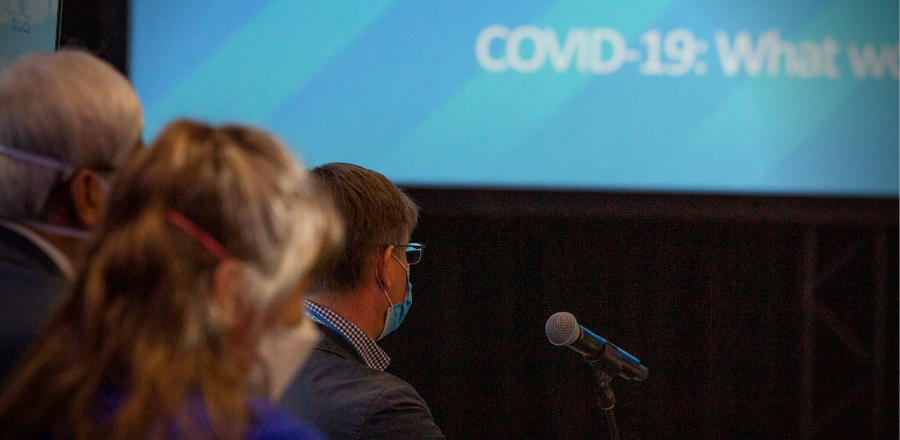COVID-19: What worked, what didn’t and what’s needed now
Attendees at the AMA’s National Conference heard from leaders and future leaders in Australian healthcare who gave their assessment of Australian governments’ COVID responses.

Attendees at the AMA’s National Conference heard from leaders and future leaders in Australian healthcare who gave their assessment of Australian governments’ COVID responses.
Australia’s response to the COVID-19 pandemic was explored at the AMA’s recent national conference.
Many good decisions were made during the pandemic which ultimately resulted in an overall successful outcome. But there are several opportunities for improvement that should be acknowledged, particularly as the country continues to cope with new waves of COVID-19 infection and the massive impacts the pandemic has had on our health system.
The session explored the lessons learned from the perspectives of:
- Commonwealth Chief Medical Officer Professor Paul Kelly
- epidemiologist and Head of the Melbourne School of Population and Global Health Professor Nancy Baxter
- CEO of the Australian Chamber of Commerce and Industry Andrew McKellar
- GP and Dermatology Fellow Dr Ahmed Kazmi
- two school aged leaders – Fulin Yan and Emily McMahon — who are on the Health Advisory Panel for Youth at the University of Sydney and recently co-authored a Lancet published study on COVID-19’s impact on the mental health of children.
Fulin and Emily spoke about their own mental health challenges during the COVID-19 pandemic, and the impact of poor state and Commonwealth government support on both the physical and mental health of young people. As young leaders of tomorrow, they called on governments to do more to tailor programs, services, and communications to young people that promote physical exercise, healthy eating, and routine mental health check-ins. They also highlighted the government’s weaknesses in ensuring linguistically diverse groups could access advice and care that is tailored and culturally appropriate, and that more could be done to include those from all backgrounds.
Using his own experience as an example, Dr Kazmi also reflected on the impact of the pandemic on health and wellbeing, in particular the health and wellbeing of our health workforce. Dr Kazmi was undertaking dermatology training in the UK when the COVID-19 pandemic began and explained how the UK response differed to that of Australia’s — with the UK experiencing high death rates, particularly amongst healthcare workers, early in the pandemic. He also shared his personal struggles during the pandemic — how border closures and lockdowns meant he was unable to attend his mother’s funeral, and led to him being separated from his partner for months — highlighting that our hardworking doctors also experienced personal challenges.
Andrew McKellar spent the first 12 months of the pandemic in France and noted the success of Australia’s response compared to other countries in Europe. Andrew shared his own story of trying to come home during the pandemic, and how the various barriers that were imposed have scarred both him and his family. He reflected on the lack of unity, collaboration and respect amongst Australian governments and political parties, and the impact of the delays in vaccines and rapid antigen tests on businesses and economies. However he praised the financial support businesses received and the establishment of consultative mechanisms in the sector to inform policy.
Professor Baxter reflected on how Australia in 2022 is very different to 2020, as we face a different virus with high vaccination rates, our highest death rates, high infection cases and hospitalisations, many people with long COVID, and a population that does not want more public health measures to reduce transmission. She said that Australia is “hoping for the best, and planning for the best”, but the unpredictability of the virus means we need to be treating COVID-19 like the ongoing threat it is — as now one of the leading causes of mortality in Australia. As we continue to move through this wave, Professor Baxter said our focus should be on reducing transmission and severity of disease using the range of public health tools we have, such as mask mandates, boosters, and antivirals. She also said that long COVID will now be part of our life, and that we need better mechanisms to understand, track and treat long COVID.
Professor Kelly reflected on the success of the Australian Health Sector Emergency Response Plan and the establishment of National Cabinet to guide and coordinate Australia’s response based on the best evidence available. He explained the process as a challenging balancing act — balancing the impact on mental health, education, jobs and the economy to protect the health of Australians. As we continue to live with COVID, Professor Kelly explained that we need concerted and sustained community action, and our doctors play an important role in this. We need to draw on everything we have learned to live as safely as possible with the virus, while also ensuring other public health issues which have been impacted by the pandemic — such as childhood vaccinations, mental health, the pressure on public hospitals, cancer screenings — are not ignored. Professor Kelly noted that the establishment of a Centre for Disease Control (CDC) will be instrumental in taking these lessons learned and preparing for future pandemics, and the Department of Health is currently undertaking an options analysis to explore potential CDC models.



